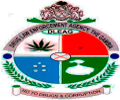SOME RELEVENT PROVISIONS OF THR DRUG CONTROL ACT 2003 REVISED LAWS OF THE GAMBIA
The anti narcotics unit now known as the Drug Law Enforcement Agency (DLEAG) was before the year 2005 a unit within the Gambia Police Force (GPF) known as the drug squad a name that it’s still widely known by.
It became an autonomous security institution in 2005 task with the enforcement of the Drug Control Act (DCA) 2003 Revised Laws of the Gambia and all international protocols and conventions relative to drugs that the Gambia is a signatory to.
it was established pursuant to Section 4 of the DCA 2003 as amended in the year 2005 which deleted the definition of the word ‘’council’’ in the principal act and substituted it with the word ‘’Agency’’ meaning the National Drug Enforcement Agency (NDEA) established under Section 4 of the DCA 2003
Subsequent amendment in 2014 changed the name to Drug Law Enforcement Agency the Gambia (DLEAG)
Functions of the Agency
15. (1) the functions of the Council are to -
- Study and advise the secretary of state on measures to be taken to prevent the misuse of drugs
- Keep under constant review, the situation in the Gambia with respect to drugs which are being or appear to the agency likely to be misuse and of which the misuse is having or appears to the agency capable of having harmful effects sufficient to constitute a social problem
- Advise the Secretary of state on measure to be taken to deal with the social problems connected with the misuse of drugs
- Advise the secretary of state of the need to restrict the availability of drugs which are being or in the opinion of the agency are likely to be misuse
- Prepare guidelines to assist persons affected by the misuse of drugs to obtain proper advice, and advice the secretary of state on the provision of proper facilities and services for the treatment, rehabilitation and after care of those persons
- Prepare guidelines designed to promote co –operation between the community services which is in the opinion of the agency have a role to play in dealing with social problems connected with the misuse of drugs.
- Educate the public (and in particular the youth) on the dangers of misusing drugs and give publicity to those dangers
- Promote research into, or otherwise obtain information about, any matter which, in the opinion of the Council is of relevance to the purpose of preventing the misuse of drugs or dealing with any social problem connected with their misuse
- In consultation with the Department of State for Agriculture, advise the Secretary of State of possible alternative crops in areas where controlled drugs or prohibited drugs are known or suspected to be under cultivation.
- Ensure compliance by the Gambia with the provisions of international drug control conventions to which it is party, and in particular implement the regulatory system provided by this Act and the regulations related to prohibited drugs, controlled drugs and precursors
- Advise the Government on the development, implementation and adjustment of appropriate national strategies to ensure the availability of controlled drugs in the Gambia exclusively for medical, scientific and related purposes, and reduce to the greatest extent possible drug abuse and related criminality.
- Provide leadership and coordination of the activities of all Government Departments and agencies, public authorities and bodies, companies, institutions and organizations in both public and private sectors which may contribute towards the development and implementations of national strategies
- Mobilize and foster public support against the abuse of drugs in the Gambia
- Consider any other matter relating to drug dependence or misuse of drugs and advise the secretary of state on the matter and
- take all lawful steps to prevent drug abuse, misuse and trafficking
(2) Every Government Department, agency or body; with functions relating to drug abuse control shall co- operate with, assist and facilitate the Council in carrying out its functions under this Act.
(3) The Council may, for the purpose of subsection (2), at any time require a Government Department, agency or body to provide any relevant information or document in its possession, power or control.
Section 33 (1) prohibits the manufacture, import, export, supply, transport or transfer, use, acquire or possessing a prohibited or controlled drug.
Sub sect. (3) Further provides that, a person who contravenes sub sec (1) commits an offence and is liable on conviction to a fine of not less than one million Dalasis and in addition imprisonment for a term not less than ten years. If conviction is for dealing to a fine not less than two hundred and fifty thousand Dalasis or imprisonment for a term not less than 3yrs or to both fine and imprisonment.#
Section 34 prohibits dealing in controlled drugs.
Section 35 prohibits a person from being in possession of a prohibited or control drugs without a valid license and any person convicted under this section is liable to pay a fine of not less than D250, 000. 00 or 3 yrs imprisonment or both fine and imprisonment.
The Drug Control (Amendment) Act 2014 made provisions for the amendment of Section 35 relative to first time offenders and the amendment applies to Cannabis possession only.
- A first time offender convicted for the possession of cannabis is liable on conviction where the quantity is between 0.1 Gram and 150 Grams to a fine of not less than D50, 000 and not exceeding D100, 000 or imprisonment for a term not less than six months, but not exceeding one year or to both fine and imprisonment.
- If the quantity is between 151 Grams to 500 Grams, the fine should not be less than D100,000 and not more than D150,000 or imprisonment of not less than one year and not more than two years or both fine and imprisonment.
- If the quantity is above 500 Grams above, a fine not less than D150,000 and not more than D250,000 or imprisonment for not less than two years and not exceeding three years or to both fine and imprisonment.
Sub section (2) further provides that where a prohibited or controlled drug is found in a premise occupied by more than one person, it shall be deemed to be in their joint possession and the burden of proving their innocence shall rest on them.
Section 36 (1) prohibits the cultivation of a plant from which a prohibited drug can be obtained.
Section 37 prohibits the manufacturing, doing or offering to do an act preparatory to or for the purpose of manufacturing controlled drugs except in accordance with this act or granted license by the minister and on the premise specified in the license
Section 40 prohibits drug related activities on premises forbidding a person concerned in the management of any premise from knowingly permitting the producing, supplying, preparing smoking or attempting to do any of the aforementioned activities to take place
Any person found on any premise with control or prohibited drugs shall be presumed to have been permitted by the person concerned with the management of the premise.
Section 41 (1) further prohibit that smoking or otherwise using a controlled or prohibited drug, Frequenting a place used for the purpose of smoking a controlled or prohibited drug or person having in his or her possession any pipe, utensil or other things made, adapted or used to abuse drugs.
Pursuant to the provision, anyone found in possession of a pipe, utensil or any other thing made or adapted to abuse drug shall be presumed to have used it for such unless he or she proves contrary.
Section 43 (1) prohibits a person from engaging in drug trafficking and if convicted under this section the penalty is one million Dalasis fine and in addition a prison term of not less than ten years.
43(4) provides the quantity as highlighted below and should be more than
- one gram of diacetylmorphine
- one gram of diacetylmorphine
- one gram of cocaine
- ten gram of opium ;or
- ten gram of cannabis resin; or
- 2 kilo gram of cannabis
As amended in the drug control amendment Act of 2
Section 44 prohibits assisting another to retain the benefit of drug trafficking.
It forbids any person or institution from knowingly concealing, removing from jurisdiction, transfer, dispose invest or other proceeds of drug trafficking
Section 51 prohibits supplying chemical inhalants to a young person (18 yrs below) knowing or having reasonable grounds to believe that it is being acquired to be abused.
53(1) prohibits any person or group of person conspiring (conspiracy), attempting, aiding and abetting in drug abuse, trafficking or related activities
Section 70 (4) (a) forbids obstructing a narcotic officer executing his duties
Section 71 gives power to officers to search and obtain evidence.
Section 73 gives power to arrest without warrant
Section 87 forbids tipping off a person who is a subject of an investigation under this act
Section 88 provides for the protection of informers.
Section 94 provides for the forfeiture of means of conveyance used for the purpose of drug trafficking
Section 97 provides for the forfeiture of proceeds acquired from drug trafficking
Section 132 permit officers in consultation with the Director General to grant bail after entering into recognizance with a surety(s) in a sum equivalent to the maximum fine of the offence committed, deposit title deed to real property and such other conditions as the Director General may impose for an offence under section 35 and any other offence by the high court.
Section 133 gives the agency the power to undertake prosecution for offences committed under the DCA 2003 and subsequent amendments

